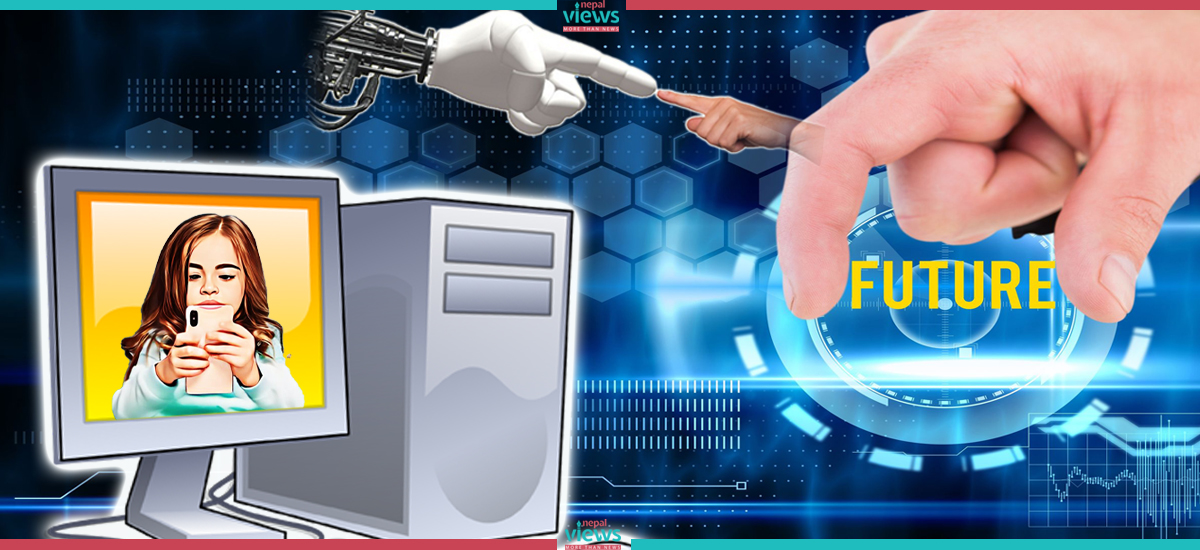Kathmandu: It has been almost four decades since American science-fiction movie ‘The Terminator’ was first released in 1984. The film portrays the artificial intelligence (AI) and cyborg as enemies of humanity.
The subsequent movie series are also more or less centered around the same theme. Though the work of science fiction, such films dash on some very real apprehensions about the potential threats of revolutionary AI. For, the world has seen many advancements in the field of AI (Artificial Intelligence) and robotics since then, turning some of sci-fi fantasies into reality.
Lately, some people have started the debate on the possible danger AI may pose to human existence. Undoubtedly, AI could negatively change the world in several ways like job displacement, biasness, automated weapon activation, etc.
Will AI be as dangerous to human existence as portrayed in science-fictions? If the answer is yes, the message for future is clear: Human beings will have no control over their fate and they will be at the mercy of IA.
Computer Scientist Alan Turing developed the concept of Universal Machine which could perform any activities of human being. From 1940s, this very mapping became the seedling of AI. As a result, we have now very sure and predictable AI tools.
During period of 1950s- 2000s researcher and scientist work on machine learning concept, natural Language processing and robotics. The process was slow as computer scientists were busy in exploring the areas of Computing. In the course of technological advancement, big data, advanced devices, increased computing speed and accuracy have led to rapid development of AI.
Real interest of scientists and researchers came from different perception toward natural language processing, machine learning and robotics machines. Initially AI was developed and set up for problem solving in field like health care, finance and transportation.
For a long time, there have been debates on AI and its potential risk to human existences. Notable tensions arose in mid 2010s as AI’s negative impact on society felt across the globe such as job displacement, unfairness and refinement and possible use of AI for harmful purposes.
In 2015, a group of leading AI researchers and scientists including Stephen Hawking and Elon Musk signed an open letter to research and work on challenges and potential threat of AI to human life.
The scenario completely changed in 2020. Open AI, a research organization, launched its chatbot ChatGpt-3 architecture, which is currently the largest and most popular AI tool that can process natural language. With this, Topics like super intelligence have become the main theme for powerful debate.
Still now, there is opposing and supporting debate and concerns in relation to the use of AI. Some people argue that if it is applied in autonomous weapon systems, global security and stability will be threatened. For other, the application of AI in health sector for heartbeat and cancer detection is remarkable.
Whether or not AI will put an end to human existence in the future, there is no need to worry about at the moment, though. And we are grateful that AI has eased our lives doing some of the most complicated works. In this sense, AI is not a replacement of human beings but a complementary tool to solve complex problems that seem impossible to be solved by our brains. The latest Chat-GPT can serve as an example.
After successful integration of AI tool, Chat –GPT, into computing world, the world is taken by storm. It has also divided people into two camps. One camp holds that AI tools make human life easier. While the other camp assumes that AI is extremely unsafe, and more hazardous for human existence than bio and nuclear weapons.
Though we’re less likely to see robotic revolts as displayed in the science-fiction movies like ‘The Terminator’, we must be aware of the fact that it can be misused or lead to unintended consequences.
For better future, AI experts, policymakers, Researchers, and society as a whole have to carefully consider the potential impacts of AI and work to ensure that its development and operationalization observe ethical principles and benefit humanity.











